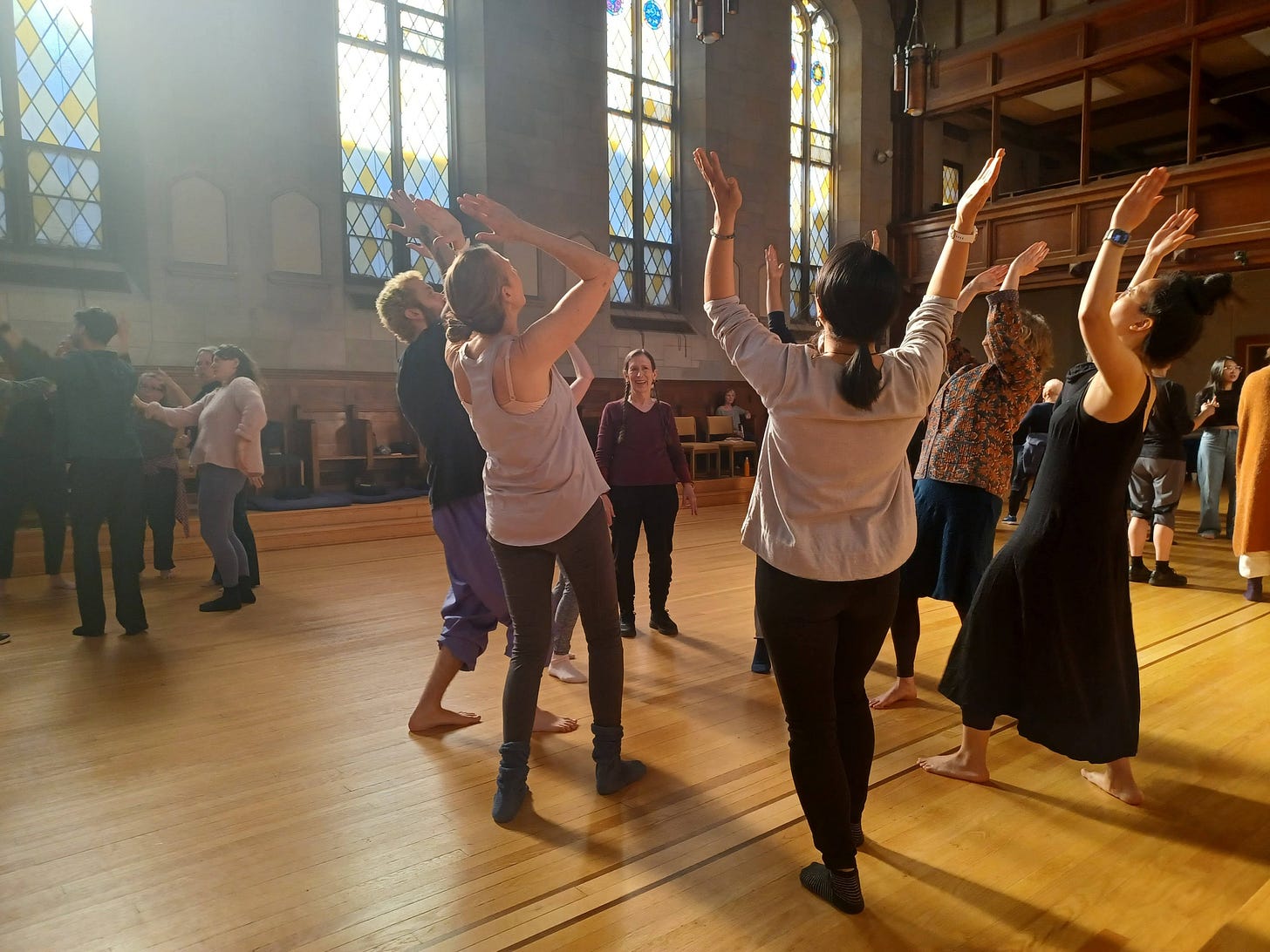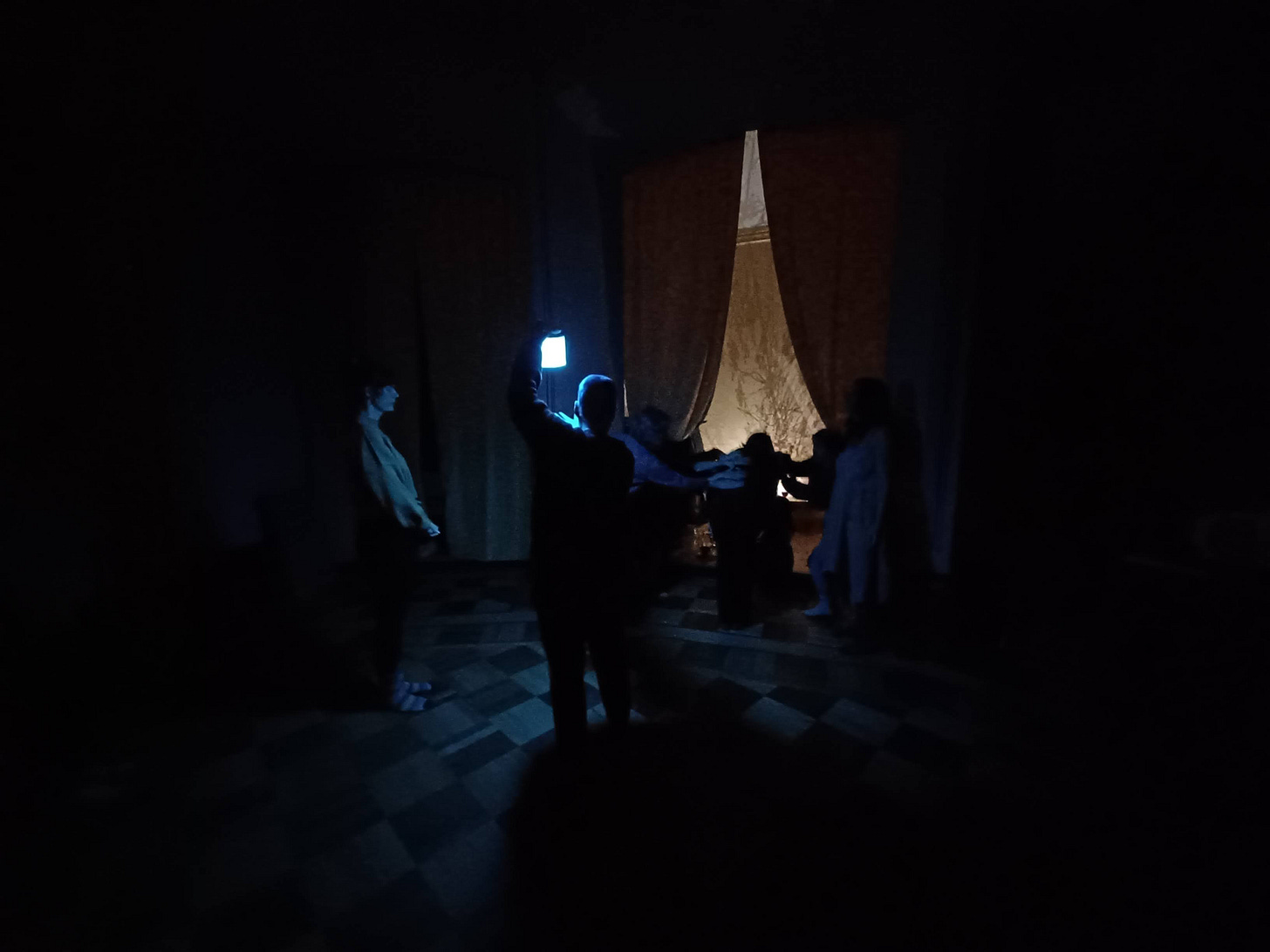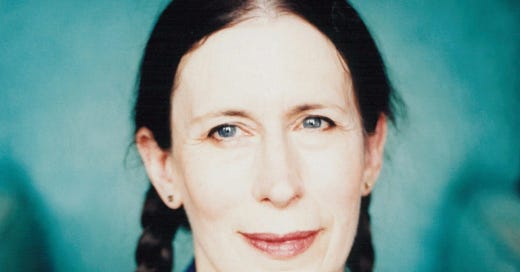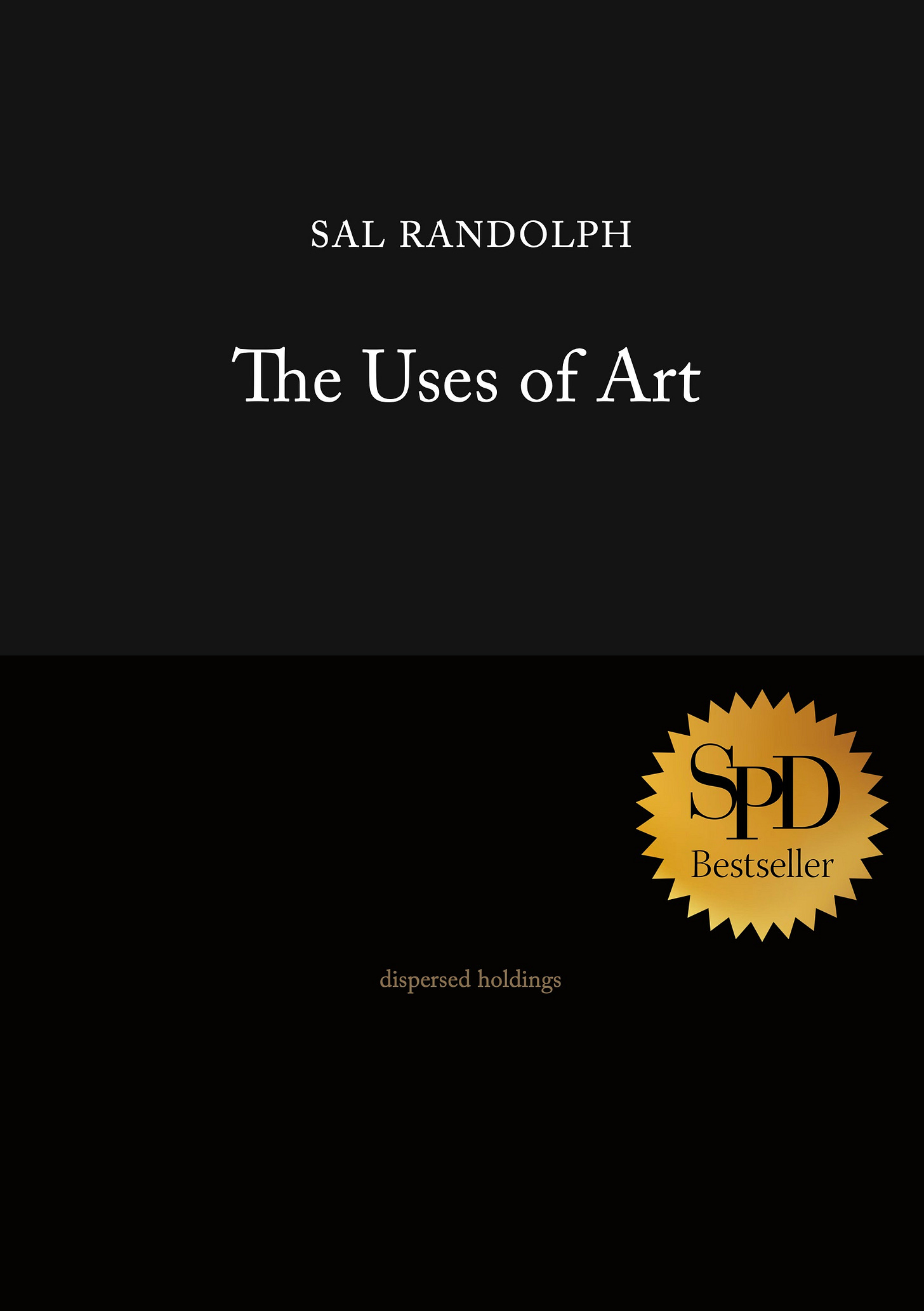Dear Friends,
I’ve spent the past few days up the Hudson at the Garrison Institute, participating in a retreat and workshop with Meredith Monk and Ellen Fisher.
Meredith Monk is a composer and interdisciplinary artist whose work is centered around the voice. I discovered her music as I rummaged through record bins during college, and loved her way of combining wordless songs, gestural movements, and theatrical imagery.
In May I saw her perform in New York, and felt the thrill again, so when I saw a notice for her workshop, Voice as Practice, I signed up on a sudden impulse. I’ve been at Garrison as part of the Village Zendo’s annual silent retreats, so the place was familiar, but the experience of working with Meredith and Ellen was something entirely new.
The days were long and full, invigorating and exhausting. As I write this, my body still feels altered — a buzz or a hum running through it, a strange lightness.
Here’s a bit of the diary I kept in between the rigorous and joyful sessions exploring voice, breath, movement, and composition.
— Sal
A Weekend with Meredith Monk

Friday
Driving up the Palisades Parkway as the light begins to fade. Bare trees, feathery, as if they go on forever. Coming to the end of the parkway, to a rotary, and over an old bridge back to my side of the river.
The deep bodily familiarity of this place. Rooms with their monk’s doors that do not lock. A funny wooden mechanism hidden in the door handle that raises and lowers the latch on the inside of the door. A monastic castle. Spartan beds, flat pillows, a folded sheet to make the bed yourself. The white matelasse coverlets, at once pleasant and stern. One towel, one blanket. Pale oak floors with narrow boards. The familiar stone flagging in the bathrooms. How many times have I been here?
We started by sitting and then by walking. We walked and curved and walked and stopped. We walked and stopped and gestured. We saw each others gestures and met each others eyes. We gestured back and forth.
We all breathed while we moved, and then we ahhhhhed with our voices. Meredith called and we responded. Simple sounds then more complex sounds, rhythms and halts. We sang a canon, a song about night and darkness. We were good at it and bad at it and beautiful.
We each offered our names as a call and a gesture which the group repeated. I was a loud and elongated Saaaa-aall, as if someone was calling my name into a steep mountain valley.
Saturday
On our feet, moving or singing for close to four hours at a time. My body is surprised out of its usual days spent reading and writing.
Last night, Meredith: “When you are moving, stillness is your friend. When you are singing, silence is your friend.”
We did a little “shabbat” warmup exercise with CHallah sounds. Challah, Chellah, Challah, Chella.
We sang a wordless song of Meredith’s with the sounds “aweena, hoo hoo” — another canon in four parts.
Ellen: “Consider four elements: space, time, motion, shape.” External space, the space of reach, space internal to the body. Time quick, ordinary and slow. Motion and stillness. Shape is a gesture of the body, a form.
In the afternoon, walking meditation.
Additive rhythms: one person starts a pattern and leaves holes or gaps (rests), the nexts adds a piece, and on and so on until it builds into great complexity. Listening for the places that are missing, places your voice could fit, maybe high, maybe low.
Music of the city, honk honk. Lullaby, grief.
Meredith: “In Buddhism, you accept what actually is.”
A new round, a canon in three parts: “John come kiss me now.”
Each group was given a type of classic song to re-invent: the work song, the grieving song, the hymn, the lullaby, the protest song, the march, and the love song.
Our group had the love song. We made a chain of love triangles, with one person seducing another into a duet of love, then another person and coming to take that love object away.
Meredith, about the grieving song: “The gesture of turning your back is very strong.”
Self-consciousness drops away. Absorbed into absorption.
Sunday
Time is layering onto itself, so I am simultaneously singing, eating tomato soup for lunch and also sleeping and also dancing. In my dreams I rehearse the songs we have been singing
My calves are permanently cramped, but this morning I discover what causes the problem: I habitually lean forward, just a bit, and grip the floor with my toes. My too-mobile feet are always working overtime. As we sing, and stand to listen, I rock slightly back, trying to find a new center.
Everyone singing at once on their own pitch, a great resonant and dissonant swell, then finding each other’s pitches, the harmonics constantly shifting, filling the room. “Like a sound bath,” Meredith says.
Long is the winter, dark is the night, please come to me oh saving light. Please come to me, oh saving light, come dwell among us oh sa-aving light.
People singing in the hallways. The clatter of the wooden latches on the doors, echoing down.
Mind in the big room, mind in my little room: two minds. Two people.
Meredith has been making shrines in her work, and set us to making them.
A procession across the space to our shrine, me as the guide, holding up a blue lantern, all of us singing a wordless song. Other shrines: an umbrella shrine in the rain, a walkway shrine with singers, a third-floor-lounge shrine with offerings of movement, a shrine in the basement where you are shown yourself in a dusty mirror.
Hockets: trading off words and notes in a song. Thrilling to practice. When it’s time to do it with everyone, my partner freezes and won’t meet my eyes. All we can do is mouth the song.
Ellen has us make Muybridge pictures: people line up, blinkered like cameras to freeze a frame as one person dances across the floor, then everyone becomes the picture they had seen. A succession of still images recreating motion.
Days without self-narration. Not without words, but without the internal shaping of story and gathering of language.
Monday
Couldn’t sleep. Waves of mysterious sadness kept waking me in the night.
We had received this in the welcoming email: Please bring one small ordinary/daily object that is meaningful to you and that you would offer the world. I had forgotten to pack anything special.
A yellow cloth was spread out and we all filed up and placed our objects. Meredith placed a palm-sized turtle. Ellen placed a small tower made of pebbles crowned by a golden fox. I placed my reading glasses. There were pens, garments, time pieces, bracelets, pendants, figures of animals.
We ended with our now-familiar song. “To say goodbye to each other,” Meredith said:
Long is our winter, Dark is our light, Oh come set us free, oh saving light. Long is our winter. Dark is our light, Oh come set us free, oh saving light. Come set us free, oh saving light, Oh come dwell among us, oh saving light.

More Information
Meredith Monks’ newest work Indra’s Net will have its New York premier this fall at the Park Avenue Armory. Tickets are available now.
Interview with Meredith Monk:
If you enjoyed this post, you’ll also enjoy my book, The Uses of Art.
Artist Sal Randolph’s THE USES OF ART is a memoir of transformative encounters with works of art, inviting readers into new methods of looking that are both liberating and emboldening.
Dazzlingly original, ferociously intelligent.
— Michael Cunningham
A joyful, dazzling treasure-box of a book.
— Bonnie Friedman
Here’s a guide, to waking up, over and over again.
— Roshi Pat Enkyo O’Hara







What a fascinating artist she is and I really enjoyed the video about her. You captured the experience of the time spent with her so well, Sal. I especially related to one of those inevitable moments in a group when one suddenly feels awkward i.e. when you realised you'd forgotten your personal item, and I really felt for you! Meredith's vocal style reminded me of Maggie Nicols, who I was lucky enough to appear with recently at a gallery opening here in Wales. I was slightly nervous about meeting her and of trying and failing to 'measure up' to her talents, but she was so generous and even adopted some of my spoken word text to experiment with when she did her free improvisation. Combining voices with others is such a fantastically cohesive thing to do and I treasure my community choir for giving me this opportunity over many years. I'm looking forward to many more inspiring posts from you in 2024. Thank you!
Thank you for this beautiful journal of the retreat. I’m a singer who can no longer sing because of illness, and have loved Meredith Monk’s work since I first heard it in the 90s. To read about your experience brought such joyful and visceral memories of singing into my body.